Results 501 to 510 of 1857
Thread: Âu
-
10-01-2018, 11:56 AM #501
German far-right terror suspects detained in overnight raids
Germany's state prosecutor has ordered the arrest of six men charged with forming a far-right terror group known as "Revolution Chemnitz." The men are accused of planning attacks on migrants in eastern Germany.
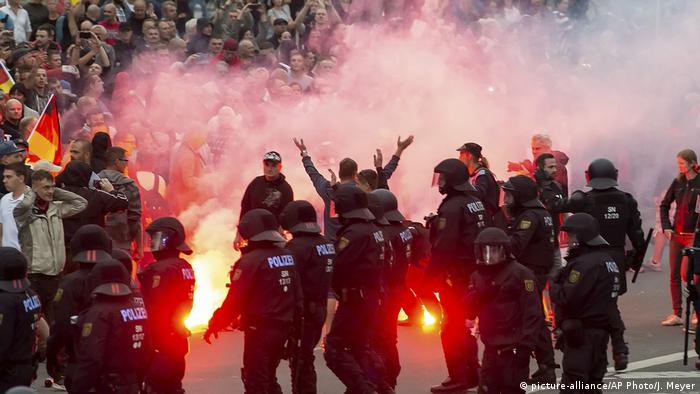
Some 100 police officers raided several properties in the German states of Saxony and Bavaria early on Monday morning as part of an investigation into a far-right terror group called "Revolution Chemnitz," named after the eastern German city that was the scene of recent far-right demonstrations following the killing of a German man allegedly by migrants.
The six men arrested, aged between 20 and 30, are suspected of forming a terrorist organization under the leadership of 31-year-old Christian K., who had already been arrested on September 14.
According to Germany's state prosecutors, the men were planning attacks on "foreigners" and people who did not share their political views. Batons, an air-rifle, and computer hard drives were seized during the raids.
Terrorist investigation
Investigators said the group had tried to acquire semi-automatic firearms, and on September 14 five of the seven suspects, including Christian K., had taken part in a coordinated attack on foreigners in Chemnitz using glass bottles, weighted knuckle gloves, and an electroshock weapon. One man was injured during the incident, which resulted in a number of arrests.
Investigators said there was evidence this had been a "practice run" for a larger attack planned for October 3, a national holiday celebrating Germany's reunification.
The prosecutors' statement said the six men were all members of the "hooligan, skinhead, and neo-Nazi scene" in the Chemnitz area, and all considered themselves leading members of the far-right scene in Saxony. Prosecutors believe the group's aim was "the overthrow of the democratic rule of law" based on their right-wing extremist ideology.
All seven men are due to be arraigned in a federal court on Monday and Tuesday. A spokeswoman for the federal prosecutors, Frauke Köhler, said on Monday that they would be joining forces with Saxony counterparts to investigate "far-right structures" in the state.
Köhler said prosecutors had decided to upgrade the investigation from a criminal to a terrorist one after assessing the group's internal communications, which showed they had been planning attacks and working to acquire weapons.
Chemnitz demos
The eastern German city of Chemnitz was the scene of several confrontations in late August and early September, after a German-Cuban man died from stab wounds following a fight with two asylum-seekers from Syria and Iraq. The Iraqi suspect was later released.
The death triggered a week of occasionally violent far-right demos and counter-demos, culminating in an anti-racism rock concert that drew a crowd of over 60,000 people. Köhler said the investigators had not yet established whether the suspects were involved in the far-right demos in Chemnitz.
The events have reignited tensions in Germany over the influx of refugees three years ago, with violence involving migrants attracting massive media attention and subsequent political fall-out: the head of Germany's domestic intelligence agency, Hans-Georg Maassen, lost his job after publicly questioning the authenticity of videos showing migrants being attacked in Chemnitz.
Germany's failure to address the threat of neo-Nazi violence was brought into sharp relief earlier this year with the end of the five-year trial of Beate Zschäpe, a member of the National Socialist Underground (NSU), a neo-Nazi cell that murdered at least ten people over an eight-year period in the 2000s. Zschäpe was sentenced to life in prison in July.
The NSU remained undetected largely because of systemic investigation failures by German police and intelligence agencies.
On Monday, German Justice Minister Katarina Barley said, "We learned from the crimes of the NSU that we have to be much more alert than before. That goes for the security forces and the judiciary, but also for the whole of society."
Interior Minister Horst Seehofer welcomed the arrests. "This is the realization of our principle, 'zero tolerance towards right-wing radicals and far-right extremists'," he told DPA news agency in Munich. "The threat of terrorism remains high in Germany, which means that we have to be prepared for an attack at any time."
/* src.: https://www.dw.com/en/german-far-rig...ids/a-45706340

 Puck Futin
Puck Futin
-
10-01-2018, 08:15 PM #502
-
10-02-2018, 08:18 AM #503
Italy's migrant-friendly mayor of Riace, Domenico Lucano, arrested
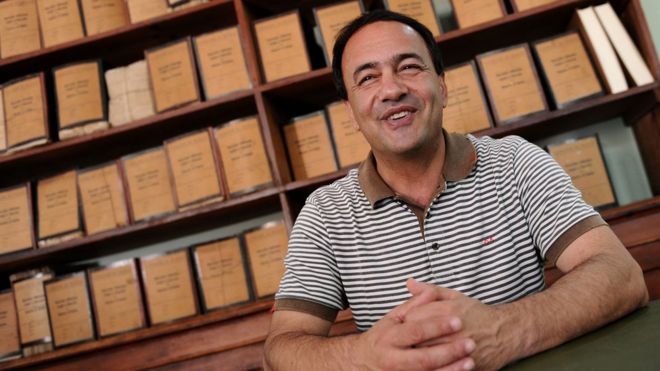
AFP
Domenico Lucano, mayor of Riace, has been placed under house arrest by financial police
The mayor of a town in southern Italy famed for taking in migrants has been put under house arrest.
Domenico Lucano, mayor of Riace, has been detained over his alleged involvement in organising "marriages of convenience" for immigration purposes.
He is also accused of assigning a contract for rubbish collection without going through the required process.
The charges follow months of tougher migration enforcement from Italy's populist government.
Mayor Lucano made headlines around the world for his unusual programme that welcomed migrants to the sparsely-populated town in Calabria, giving them abandoned homes and on-the-job training, in the hope that the new arrivals would rejuvenate the economy.
He started the programme in 1998 under a previous government, and since then hundreds of migrants have joined the small town of about 2,000 people.
The success of the programme, lauded by many as a model of integration, led to Mayor Lucano being named one of the world's 50 greatest leaders by Fortune magazine in 2016.
On Tuesday, he was arrested by Italy's financial police as part of an investigation into allegedly facilitating illegal migration.
What are the charges?
The first charge detailed by prosecutors involves the arrangement of marriages of convenience to get around immigration regulations.
Prosecutors said they had wire-tapped Mr Lucano's phone and recorded at least one exchange in which the mayor appeared to suggest marriage as a solution to a woman's immigration problems, in a way they said could not be misunderstood.
One excerpt concerned a Nigerian migrant who had been denied residence three times, the statement said. Mr Lucano is reported to have said that marrying an Italian citizen was "the only way forward".
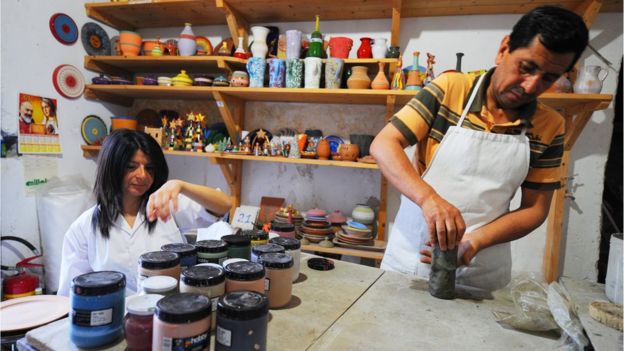
GETTY IMAGES
Many of the resettled refugees have been trained by local craftspeople
As mayor, Domenico Lucano is in charge of the town's civil registry.
In the excerpts he is said to refer to a similar wedding in the past, and his ability to arrange a ceremony quickly. He is also quoted offering to acquire an ID card to say the woman was a resident of Riace.
Separately, prosecutors said that rubbish collection services had been allocated to two companies without going through the required public tender process.
That charge may also have a connection to the town's migrant programme. The two companies were community co-operatives established "to provide work for the people of Riace and migrants", according to Italian newspaper La Repubblica.
His partner Tesfahun Lemlem faces the same charges and has been banned from living in the area.
No abuse of funds
However, the most serious allegation made against the mayor has been dropped.
The investigation had originally explored alleged mismanagement of public funds provided by the interior ministry. Prosecutors said that while the management of funds may have been disorderly, there was no evidence that any amount had been misappropriated.
Italy's populist government came to power in June with the head of the right-wing League party, Matteo Salvini, taking the role of interior minister. He has since pursued a series of anti-migration policies.
Mr Salvini reacted on Twitter by wondering what "all the good guys who want to fill Italy with immigrants" would say about the story.
He singled out writer Roberto Saviano, a vocal critic of Mr Salvini and a supporter of Riace's migration programme.
Writing on Facebook about the arrest, Mr Saviano said the government was "taking the first step towards the definitive transformation of Italy from a democracy to an authoritarian state."
Other government critics said the mayor's only crime had been one of humanity.
Mayor Lucano has yet to issue a statement on his arrest.
/* src.: https://www.bbc.com/news/world-europe-45717920

 Puck Futin
Puck Futin
-
10-04-2018, 11:16 PM #504
Xã luận bên lề hiện tình xã hội Đức. Viết nhiều thứ đúng đến không ngờ:
Why Is Eastern Germany So Far Right?
Almost 30 years after reunification, the former Communist region is now home to right-wing extremism.
Anna Sauerbrey

By Anna Sauerbrey
Ms. Sauerbrey is an editor on the opinion page of the newspaper Der Tagesspiegel.

A right-wing protester held a German flag during a protest in Koethen, Germany, in September.CreditCreditSrdjan Suki/Epa-Efe, via Rex
BERLIN — On. Oct. 3, Germans celebrated Reunification Day, the moment when, 28 years ago, the former East and West Germany became one nation again. And yet this year, instead of celebrating our unity, there is a growing sense of estrangement. East and west are drifting apart again.
A few weeks ago, a young man was stabbed to death at a city festival in Chemnitz, a city in eastern Germany; afterward two asylum seekers were arrested in connection with the attack. Large demonstrations broke out around the city, dominated at times by hundreds of right-wing extremists. Some raised their hands in the Hitler salute; journalists and counterdemonstrators were verbally and physically attacked; a mob threw stones at the owner of a Jewish restaurant.
Similar demonstrations broke out in Köthen, a town of 30,000 inhabitants in the eastern German state of Saxony-Anhalt. And on Monday, the police arrested seven men accused of planning attacks on politicians and foreigners on Wednesday.
These events are not random. While violent crimes committed by right-wing extremists are down from 2016, they are still far more frequent in the five eastern German states than in the west, according to the annual report of Germany’s interior secret service. And then, there are the polls. The eastern states of Brandenburg and Saxony will both hold elections next September. For both states, pollsters predict record results for the far-right populist Alternative for Germany party.
East Germany was, of course, a Communist country; today it is a hotbed of far-right sympathy and outright hatred. What happened?
The question angers Wolfgang Thierse, a Social Democrat and former president of the German Parliament, who was raised in the East. In the 1970s, he worked briefly for the Ministry of Culture in the German Democratic Republic, or East Germany, but he was let go after refusing to support the expulsion of Wolf Biermann, a popular singer and critic of the Communist government. There is no such thing as “the East,” Mr. Thierse told me. Eastern Germany, he says, is not one place, but a mix — areas of prosperity, creativity and economic innovation next door to areas of economic squalor and despair.
Mr. Thierse’s assessment is reflected in the government’s annual “Report on the State of the German Union,” which was presented last week. While pensions and wages are rising and unemployment is down, the average income in the former East lags the former West by around 15 percent. The eastern economy sports some champion businesses, but has altogether fewer large companies, and lesser international investment. The eastern states have an older demographic, and a harder time finding qualified workers.
The economic differences are just one piece in the puzzle of why the East seems so far to the right. Other explanations focus on the legacy of the political culture of the German Democratic Republic. Many across Germany felt like Chancellor Angela Merkel imposed her decision to accept a large number of refugees on the country — but eastern Germans, having lived under an authoritarian regime, reacted more strongly to decisions they feel they did not have a say in.
Second, there are fewer migrants living in the east; people there lack the opportunity for everyday interactions with them, and thus harbor irrational fears of outsiders. Some also claim that eastern Germans, not having learned what democracy is like, are more easily frustrated with its tedious processes and often less-than-perfect results.
Johannes Staemmler stresses a different point. Mr. Staemmler, born in the eastern city of Dresden in 1982, co-founded Third Generation East, a network of young professionals of eastern German descent. Today, he’s a scientist and counselor working for a think tank in Potsdam, outside Berlin. He points out that many who joined the far-right protests in Chemnitz or vote for the Alternative for Germany are too young to have more than the faintest memories of the G.D.R. But they do remember the radical changes of the 1990s: privatization, the rapid death of East German industries and ensuing job losses.
Mr. Thierse and Mr. Staemmler, both born in the East, are heard and respected by Germans on both sides of the geographic divide. Overall, however, the debate about what’s happening in the east is dominated by western voices. Even 28 years after Germany’s reunification, most prominent journalists are westerners, as are most prominent policymakers and business leaders.
So when Germany discusses why the east is so far right, condescension almost inevitably sneaks in: For the sake of the argument, eastern Germany is unbuckled from the rest of the country, and the historical border is redrawn. In this new, old divide, eastern Germans are reduced to being subjects of analysis and policy proposals — never participants in the conversation.
The east and west are still like unequal siblings. The strong one loves his smaller and uglier brother and accepts that his deviant behavior comes from trauma, but he still looks down on him. This subjugation of eastern Germans to mostly western German psychoanalysis is a political drama in itself. It seems like even in their most violent, most determined actions, eastern Germans can never be agents.
“Yes, eastern Germans are on the couch,” said Mr. Staemmler when I offered this interpretation. To him, however, the current public analysis is not necessarily disenfranchising. He says it could also become a moment of political empowerment. Suddenly people who haven’t voted in decades are going to the ballot box. They may not vote for the party the rest of the country would like them to vote for. But at least they are politicized, and have the nation’s attention. “You could also look at it this way: Whoever is on the couch has the chance to talk.”
Whichever way, it really is the moment to talk. It may mean talking to someone who is yelling at you, as Mr. Staemmler puts it. But it still is better to try it anyway, instead of letting eastern Germans sink back into scornful silence.
Anna Sauerbrey is an editor on the opinion page of the newspaper Der Tagesspiegel and a contributing opinion writer.
Follow The New York Times Opinion section on Facebook and Twitter (@NYTopinion).
/* src.: https://www.nytimes.com/2018/10/04/o...far-right.html

 Puck Futin
Puck Futin
-
10-05-2018, 10:30 PM #505
Một trong những hệ quả của chủ nghĩa cộng sản hay của chế độ độc tài là cái căn bệnh yêu nước rẻ tiền, yêu nước bằng mồm và yêu nước bằng cách bài ngoại và nung nấu thù hận dân tộc. Yêu nước theo kiểu phải đứng lên ưỡn ngực hát quốc ca ông ổng, trưng bày quốc kỳ khắp chốn. Yêu nước theo kiểu chửi bới nước khác, dân tộc khác. Yêu nước theo kiểu chuyện gì cũng nhân danh tổ quốc: thí dụ như những tên gọi của PEGIDA (chữ P ở đầu là viết tắt từ Patriotic) hay AFĐ (chữ Đ ở cuối là viết tắt từ Đức), tương tự như là chiến dịch mãi võ MAGA ở Mỹ (chữ A ở giữa là viết tắt từ AmeriKKKa)...
Ai cũng nhận thấy những nước cộng sản đã dần dần trở thành tư bản, nhưng đâu có ngờ những nước tư bản bây giờ cũng đã dần dần giống cộng sản hơn vì những thành phần cực hữu, cực dốt nhưng cực độc, không có học hành nhưng có vũ trang, không có nhân đạo nhưng có tôn giáo, không có tâm hồn lớn nhưng lại có chí lớn, không rõ chủ thuyết nhưng rất rõ chủ tâm.
-
10-07-2018, 11:05 PM #506
ya, miệng nói chủ hoà nhưng tâm địa là chủ chiến

 Puck Futin
Puck Futin
-
10-07-2018, 11:07 PM #507
Giáo hoàng Phanxicô trước nguy cơ “đảo chính” trong Vatican
Thu Hằng
Đăng ngày 06-10-2018
Sửa đổi ngày 06-10-2018 14:46

Giáo hoàng Phanxicô tại quảng trường Thánh Phêrô, Vatican, ngày 26/06/2018.
REUTERS/Tony Gentile
Trước tai tiếng ấu dâm mà Giáo Hội đang trải qua, với đỉnh điểm là quyết định ngày 28/09/2018 huyền chức linh mục Fernando Karadima, người Chilê, giáo hoàng Phanxicô triệu tập toàn bộ chủ tịch các hội đồng giám mục đến họp thượng hội đồng giám mục tại Roma từ ngày 21-24/02/2019. Mục tiêu là “phòng ngừa lạm dụng đối với trẻ em và người lớn yếu đuối”.
Với chủ đề “Hiểm họa lơ lửng trên Vatican”, Courrier international trở lại tai tiếng ấu dâm đeo bám Tòa Thánh với một số bài nhận định của báo chí nước ngoài. Tai tiếng này càng làm gia tăng sự sứt mẻ trong nội bộ Vatican, dù những người ủng hộ vẫn đoàn kết bảo vệ giáo hoàng Phanxicô.
Liệu giáo hoàng Phanxicô phải ra đi sau 5 năm đứng đầu Giáo Hội?
Ít ra đây là một toan tính của cánh bảo thủ trong Vatican do lo sợ Giáo Hội bị thay đổi chưa từng có. Đây là nhận định của báo Financial Times (Luân Đôn), được Courrier international trích dịch. Tờ báo Anh cho rằng “trước khuynh hướng cởi mở và các chính sách cải cách của giáo hoàng, cánh truyền thống trong Giáo Hội tìm cách khai thác sự phản đối kịch liệt về các vụ lạm dụng tình dục để lật đổ giáo hoàng”.
Âm mưu này bắt đầu từ cuối tháng 08/2018. Giáo hoàng Phanxicô tông du Ailen, nơi Vatican bị lên án nhắm mắt làm ngơ trước những lời tố cáo ấu dâm xảy ra tại quốc gia này trong suốt nhiều năm. Giáo hoàng đã gặp gỡ nạn nhân, không ngừng xin lỗi, thể hiện hổ thẹn và cầu nguyện cho các nạn nhân. Mọi nỗ lực của giáo hoàng Phanxicô bị dội gáo nước lạnh ngay khi trở về. Trong bức thư ngỏ, sứ thần Vatican ở Mỹ, tổng giám mục Carlo Maria Viganò, cáo buộc giáo hoàng bao che các vụ ấu dâm của cựu giám mục Washington Theodor McCarrick. Không vòng vo, tác giả bức thư yêu cầu giáo hoàng từ chức.
Chỉ trích thì nhiều nhưng bằng chứng thì ít, bức thư dài 11 trang còn nhắm đến 12 quan chức Vatican, phần lớn là những người thân cận của giáo hoàng Phanxicô và có những quan điểm tiến bộ. Theo ông Brendan Walsh, tổng biên tập tuần báo Công giáo Anh The Tablet, “kẻ thù của giáo hoàng Phanxicô và những cải cách của ngài sử dụng “bằng chứng” của Viganò để yêu cầu giáo hoàng từ chức. Họ sử dụng tai tiếng ấu dâm phục vụ cho mục đích chính trị riêng”.
Tư tưởng cởi mở của giáo hoàng Phanxicô bị phản đối trong Vatican
Thực vậy, phe bảo thủ rộng quyền hành động trong suốt 50 năm qua, ngay cả dưới thời giáo hoàng Gioan Phaolô II và Bênêdictô XVI. Vì vậy, họ tìm cách hạ uy tín giáo hoàng Phanxicô, người chủ trương cải cách và quan trọng hơn là phải làm được trước khi giáo hoàng lập được một đa số tiên tiến trong hội đồng bầu giáo hoàng. Đây chính là điểm mấu chốt của cuộc chiến hiện nay. Họ không muốn giáo hoàng tương lai sẽ tiếp tục những cải cách của người tiền nhiệm Phanxicô.
Ngoài ra, phe bảo thủ còn chống giáo hoàng Phanxicô vì những lời kêu gọi độ lượng, thái độ từ bi đối với người đồng tính, người li hôn hoặc tái hôn. Với Vatican, đây là cách thích ứng với thực tế xã hội, nhưng với phe bảo thủ, đây là “một cách lách giáo lý” và điều này không chấp nhận được.
Phe chống giáo hoàng Phanxicô không ngần ngại gắn những vụ ấu dâm với việc giáo hoàng không lên án người đồng tính. Theo ông Chris Patten, chủ tịch danh dự đại học Oxford, kiêm cố vấn truyền thông của giáo hoàng, “gắn vấn đề đồng tínhvới các vụ ấu dâm là cách đê hèn mà phe cực hữu trong Giáo Hội không ngần ngại sử dụng” để hạ uy tín giáo hoàng Phanxicô.
Bài báo kết luận cuộc chiến tranh giành quyền lực không những gây ảnh hưởng đến danh tiếng của Vatican, mà còn kéo dài nỗi đau, sự chịu đựng của các nạn nhân lạm dụng tình dục trong Giáo Hội. Nhiều tiếng nói bắt đầu chỉ trích giáo hoàng Phanxicô còn lưỡng lự để đưa thủ phạm ra pháp luật.
Với báo La Repubblica (Roma), khi tung tin đồn Vatican bị chia rẽ sâu sắc, những người tung tin có một mục đích chính trị rất rõ ràng: thu phục lại số giáo dân bảo thủ nhất, thất vọng vì giáo hoàng Phanxicô.
Nhìn từ nước Mỹ, nhật báo Washington Post, được Courrier international trích dịch, nhận định những con chiên mộ đạo nhất cũng bắt đầu nghi ngờ sau những phát giác ấu dâm gần đây trong Giáo Hội. Điều trớ trêu, theo nhận định của giáo sư thần học Mỹ Joseph Capizzi, “chúng ta không tin vào hội đồng giám mục để giải quyết các vấn đề này. Rất nhiều người muốn một cơ quan thế tục điều tra. Họ quen hơn và cảm thấy thoải mái hơn với ý tưởng này”.
Đây chính là trường hợp tại Pháp. Mới đây, nhiều nhân vật quan trọng đã yêu cầu thành lập một ủy ban điều tra nghị viện về tình trạng ấu dâm trong Giáo Hội Pháp, hiện còn rất chậm trễ so với những gì đã được tiến hành ở một số nước như Chilê, Úc, Mỹ, Đức...
/* nguồn: http://vi.rfi.fr/quoc-te/20181005-gi...-trong-vatican

 Puck Futin
Puck Futin
-
10-09-2018, 08:24 PM #508
Bulgari để tang nữ phóng viên bị ám sát
Tú Anh Đăng ngày 09-10-2018 Sửa đổi ngày 09-10-2018 11:45

Bulgari: Lễ canh thức ở thủ đô Sofia, đêm 08/10/2018, tưởng niệm nhà báo bạc mệnh Viktoria Marinova, bị giết ngày 6 /10/2018 tại Ruse.
REUTERS/Dimitar Kyosemarliev
Ngày hôm qua cả nước Bulgari để tang Viktoria Marinova. Thi thể của nữ phóng viên truyền hình trẻ đẹp, bị cưỡng bức và siết cổ, được phát hiện trong công viên ở Rusê, hôm thứ Bảy trong lúc chính quyền Bulgari đối đầu với những cáo buộc biển thủ tài trợ của Bruxelles.
Tại các thành phố lớn, hàng trăm người dân tham dự lễ canh thức. Áp lực trong nước và từ nhiều nước châu Âu thúc giục Bulgari phải làm sáng tỏ vụ án.
Từ Sofia, thông tín viên Damian Vodénitcharov tường thuật :
Dưới chân dung di ảnh người bạc mệnh là hàng nến hình trái tim. Hai ngày sau cái chết của nhà báo Viktoria Marinova, các đồng nghiệp của cô vẫn còn hãi hùng. Mặc dù nhà chức trách nói là chưa biết nguyên nhân án mạng nhưng không một ai tin vào chuyện ngẫu nhiên. Bởi vì, chương trình truyền hình địa phương do cô đảm trách vừa phát sóng một phóng sự điều tra về nghi án lừa đảo để biển thủ tiền tài trợ của Liên Hiệp Châu Âu và có liên can đến một số doanh nhân và nghị viên địa phương.
Nhà báo Elena Nedkova nhận định : Giết một phụ nữ để biểu dương sức mạnh, để buộc người khác im tiếng, để hù dọa phóng viên điều tra tìm sự thật, để ngăn chận những người tranh đấu vì một đời sống tốt đẹp hơn. Thông điệp (của kẻ chủ mưu) rất rõ ràng. Sau một hay hai phóng sự, tác giả có thể chết như thế đó.
Nữ phóng viên Maria Kostova cũng cho rằng vụ giết người cực kỳ thô bạo này chứng tỏ chính phủ Bulgari không đáng tin cậy : Đây là một vụ giết người kinh khiếp. Cảnh sát không có khả năng bảo vệ an ninh cho nhà báo. Hoặc là họ tìm cách bao che một cái gì đó. Trong cái nhìn của chính quyền, chúng tôi chỉ là một bầy động vật, không thật sự là con người.
Viktoria Marinova là nhà báo thứ ba bị giết trong Liên Hiệp Châu Âu trong vòng không đầy một năm. Borislov Sandov, thành viên đảng Xanh bảo vệ môi trường nhận định : Chính ở trong những nước có nạn tham ô đục khoét như Malta,Slovakia và Bulgari thì người ta mới dám giết nhà báo. Chuyện ám sát phóng viên không xảy ra ở các nước Tây phương nơi mà nền dân chủ đã được phát triển vững chắc. Dân chủ và an toàn cho nhà báo chắc chắn có quan hệ nhân quả.
Cảnh sát đang tiến hành điều tra. Chưa có một kẻ tình nghi nào bị bắt.
/* nguồn: http://vi.rfi.fr/quoc-te/20181009-bu...vien-bi-am-sat

 Puck Futin
Puck Futin
-
10-13-2018, 10:21 AM #509
Berlin protests against far-right politics draw thousands
Over 200,000 people have taken to the streets of Berlin to face down the rise of far-right populism in Germany and Europe. The protesters were demanding more solidarity with marginalized groups.
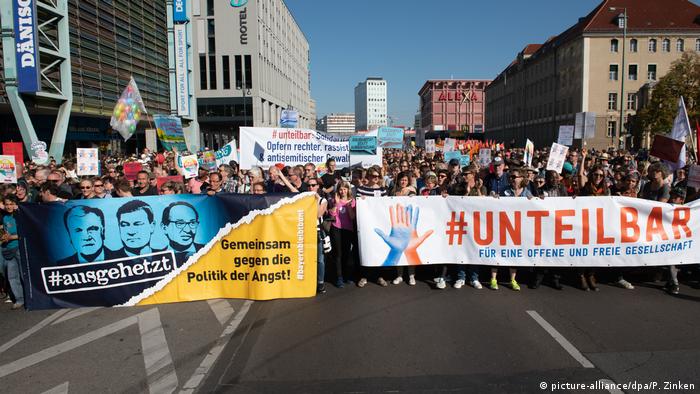
Berlin produced an absurdly hot and sunny fall day on Saturday to welcome an estimated 240,000 people demonstrating against racism and calling for solidarity against the rise of far-right populism across Germany.
A 5-kilometer (3-mile) stretch of the capital city's center, from Alexanderplatz through the Brandenburg Gate to the Victory Column, had to be closed down to accommodate the huge parade, which was united under the hashtag #unteilbar ("indivisible").
The crowds were punctuated by 40 trucks mounted with loudspeakers, some delivering political messages, others pumping out music of all genres. They also included the traditional Berlin staple: the techno truck surrounded by semi-clothed dancers. The march was bookended by two concert events, the second of which was expected to stretch into the evening.
All kinds of organizations joined in, including trade unions, NGOs, political parties (both mainstream and fringe), gay rights groups, schools and theaters, all carrying a variety of banners, each with their own cause to promote (Ryanair workers were a conspicuous presence), but all united behind the slogan: "Solidarity not marginalization."
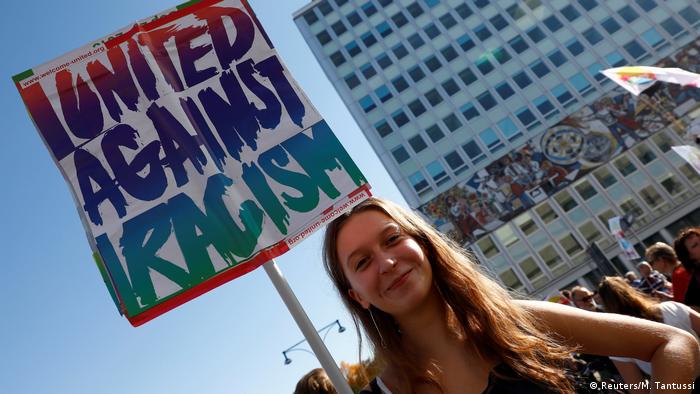
Organizers said 240,000 people had appeared at Saturday's demo
A necessary reaction
The number of people who made the original call to join Saturday's demo would have made an impressive crowd themselves — some 10,000 organizations and individuals signed the declaration last week, which began with a note of alarm at the current trend in Germany's political debate: "A dramatic political shift is taking place: Racism and discrimination are becoming socially acceptable," it read. "What yesterday was considered unthinkable and unutterable has today become a reality. Humanity and human rights, religious freedom and the rule of law are being openly attacked. This is an attack on all of us."
The declaration went on to attack the effects of global capitalism: "Millions suffer the impact of an underinvestment in basic care, healthcare, childcare and education."
There was a widespread feeling in the crowd that such a mass statement was a vital correction in a country that has seen ordinary people joining far-right, even neo-Nazi protests, and several conservative politicians adopting anti-immigrant rhetoric.
"There are people here who want to show that they don't support what is going on in Germany, including from established politicians, all this hate, this whole debate about immigration," said Rola Saleh, a social worker who helps young refugees in the eastern city of Chemnitz, where far-right violence made international headlines in late August.
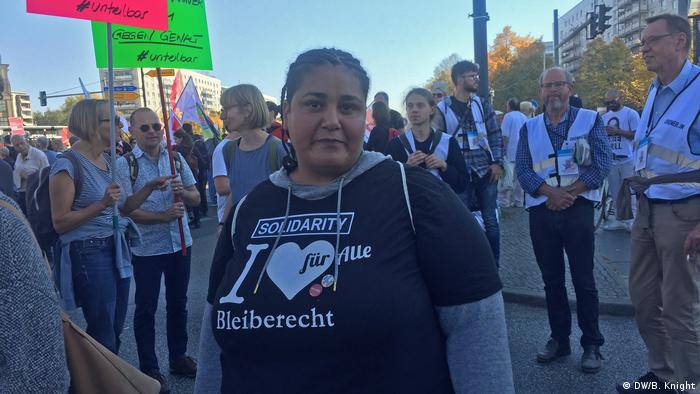
Saleh said many refugees in Chemnitz have become scared following recent violence
Criminalizing refugees
Saleh, who was in Berlin to give a speech for her group Jugendliche ohne Grenzen ("Youth without Borders"), told DW that refugees and people helping them were being "criminalized" in Germany.
"At the moment, a new police law is being planned in Saxony that would allow our advice center, where we give refugees legal advice, to be spied on," she said. "These are things that are happening now: deportation custody, 'anchor centers', the marginalization of refugees."
"We don't have answers to a lot of the questions that the refugees ask us," she said. "After the conflicts in Chemnitz, a lot of the refugees are afraid and uncertain about the situation. They feel like they've been abandoned; a lot of them are trying to leave Saxony, or they're afraid they'll be provoked into criminal acts by a situation. If you feel like you live in a state where the police are not ready or able to help you, you start thinking about finding ways to protect yourself."
Julia Naji joined Saturday's protest to represent Cycling Friends, a Berlin initiative that, among other things, runs cycling classes for refugees. "Today, people will meet up and show that we should fight against racism and homophobia as loudly and with as many people as possible," she told DW.
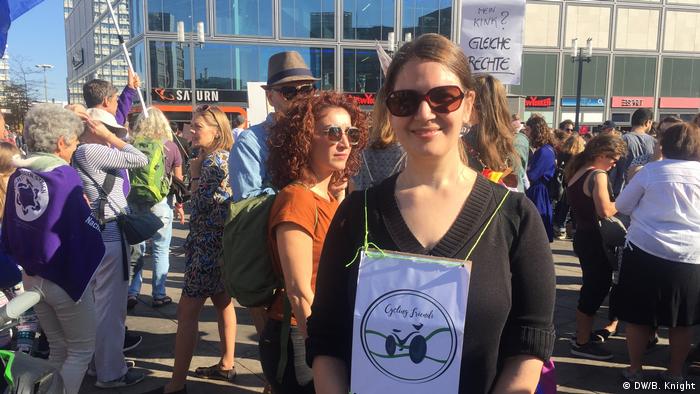
Julia Naji emphasized the importance of Saturday's demo
She emphasized that most of the refugees she sees are happy living in Berlin. "Most of them feel quite welcome here and are astonished about the very small portion of the society being against them," she said.
Naji, a German with a Syrian father, says the politics of far-right parties like the Alternative for Germany (AfD) are aimed at personally marginalizing her in her own country. "I'm a German, but I myself would feel excluded from any politics and any society that does not open itself to everyone," she said.
Political support, and dissent
Senior government figures lent their support to the demonstration, most notably Foreign Minister Heiko Maas, who tweeted: "It is a great signal that so many people are going on the streets and showing a clear position: We are indivisible. We won't let ourselves be divided — certainly not by right-wing populists."
While Maas' Social Democratic Party (SPD), along with the Greens and the socialist Left party, all offered official support, Angela Merkel's Christian Democratic Union (CDU) was absent on Saturday.
But there was some political dissent on the left too, especially from Left party leader Sahra Wagenknecht, who angered plenty of people by declaring that she would not be taking part in her party's section of the demo.
During a podium discussion in Berlin on Tuesday night, Wagenknecht said she found the demo's position problematic, since she claimed it called for "open borders for everyone." This, she said, marginalized people who were against open borders but also against racism. There is no mention of open borders in the demo's official declaration, though some people on Saturday were carrying banners that read, "Make Fortress Europe Fall."
Wagenknecht has held a somewhat isolated position in her party since beginning her own separate left-wing movement, named "Aufstehen" — or "Stand up."
/* src.: https://www.dw.com/en/berlin-protest...nds/a-45873439

 Puck Futin
Puck Futin
-
10-17-2018, 05:00 AM #510
Trục xuất về A-Phú-Hãn
Trẻ con từ Âu Châu về thế này đây
Không giấy tờ, không chỗ học hành, không liên lạc với người thân: trẻ con và thiếu niên gặp khó khăn sau khi bị Châu Âu trục xuất. Và tình trạng an ninh ở nước này vẫn bế tắc.

Trẻ con A-Phú-Hãn ở Kabul
Thứ Tư, 17 tháng Mười 2018
"Ba em nghĩ rằng em đã làm sai cái gì đó nên mới bị trục xuất. Ông ấy giận dữ với em", một thiếu niên 17 tuổi bị Na Uy trục xuất về A-Phú-Hãn kể lại.
Tổ chức nhân quyền cho trẻ con Save The Children phỏng vấn em cùng 56 đứa trẻ khác bị trục xuất trở về từ các quốc gia Châu Âu đăng trên bài tường trình "Trở về chốn hư vô".
Khảo sát được trình bày hôm thứ Ba vẽ ra một bức tranh ảm đạm cuộc sống mà những đứa trẻ được phỏng vấn ở Kabul và Herat đang hứng chịu kể từ khi chúng bị cưỡng bức hoặc là tự nguyện hồi hương.
Như chuyện một em trước đây sống ở Iran rồi trốn sang Na Uy. Em chưa bao giờ biết A-Phú-Hãn là gì cả. "Gia đình em còn sống ở Iran. Ở Kabul em chỉ biết có một người của tổ chức cứu trợ và một người bạn thôi".
Tất cả trẻ con được Save The Children phỏng vấn có tuổi từ 8 đến 18 lúc chúng đến Châu Âu. Đa số chạy sang Na Uy (17), Thụy Điển (12) và Đức (9).
Nhân viên của Thinktank thế giới Samuel Hall đã nhờ tổ chức Save The Children làm cuộc thăm dò đa số các đứa trẻ qua trả lời câu hỏi trên giấy, và họ phỏng vấn trực tiếp 12 em. Kết quả tổng quát như sau:
- 39 em trong 57 em không có cảm giác an toàn khi trở về
- 10 em đơn thân lúc bị trục xuất về A-Phú-Hãn. Chỉ có 1 em trong số đó nói rằng nhà chức trách ở Châu Âu có liên lạc với người thân của em trước khi trục xuất.
- Có 10 đứa trẻ cho biết, sau khi các em hồi hương có người dụ dỗ vào phiến quân, dụ dỗ vào xã hội đen hoặc là dụ dỗ làm những chuyện khác.
- Trước khi bị trục xuất có 45 đứa trẻ được đi học. Trở về A-Phú Hãn chỉ còn 16 đứa đi học.
- 5 em hoàn toàn không có giấy tờ tùy thân nên việc xin đi học hoặc đi làm trở thành vấn đề.
- Nhiều em trở về phải ở đậu nhà bà con mà chúng có cảm giác không còn được hoan nghênh hoặc là phải đến một địa phương lạ hoàn toàn không quen biết ai.
- 8 em được phỏng vấn cho biết chưa bao giờ đặt chân tới A-Phú-Hãn, bởi vì chúng nó sinh ở Pakistan hoặc là ở Iran.
- Ba phần tư số em tuổi vị thành niên cho biết vì sợ và không biết tương lai ra sao nên sẽ tìm cách trốn nữa.
- Các em được phỏng vấn đã sống ở thành phố Kabul và Herat mấy tháng nay từ khi hồi hương, và có vài trường hợp đã sống vậy mấy năm nay. Có vài em vừa sinh nhật 18 tuổi là bị Châu Âu trục xuất, đa số thì tuổi vị thành niên.
Taliban gia tăng tấn công
Cho cuộc thăm dò này có 24 phụ huynh hoặc là người bảo hộ và 30 người đại diện của chính quyền A-Phú-Hãn, đại diện chính quyền Châu Âu cũng như các tổ chức phi chính phủ được mời phỏng vấn.
Cuộc sống ở A-Phú-Hãn dễ thường không chỉ khó khăn mà còn nguy hiểm, việc trục xuất về đây luôn là vấn đề tranh cãi chính trị. Trong những tháng qua nhóm Taliban Hồi giáo cực đoan đã từ chối thương thảo hòa bình và đình chiến, và gia tăng tấn công lực lượng an ninh, chính phủ, các trung tâm hành chính tỉnh lỵ. Ngoài ra phiến quân Nhà Nước Hồi Giáo IS đã có các cuộc tấn công nặng nề.
Không có cơ quan nào làm thống kê có con số xem có bao nhiêu trẻ con bị trục xuất về A-Phú-Hãn còn sống sót cả, tổ chức Save The Children cho biết. Vì sợ phải mang tiếng những kẻ thất bại về từ Châu Âu, những gia đình ở đó cũng không dám công khai các chuyện trốn chạy của mình.
Các kết quả thăm dò này vì lý do nằm ở con số quá ít người tham gia, nên cũng không thể đại diện cho bất cứ điều gì. Tuy nhiên kết quả này có thể phản ảnh tình trạng nhiều đứa trẻ con A-Phú-Hãn.
Bà Meike Riebau, chuyên gia luật pháp của tổ chức Save The Children cảnh giác, "Phải chấm dứt việc trục xuất các đứa trẻ về A-Phú-Hãn ngay. Nước này là một trong những nước nguy hiểm nhất trên thế giới". Cái quyền được bảo vệ của các em, việc học hành và y tế không có sự bảo đảm nào.
Tổ chức này yêu cầu phải có một bản kế hoạch tái hội nhập cho các em bị trục xuất. Một chương trình hồi hương có tổ chức và thống nhất toàn Châu Âu, có sự theo dõi và điều hợp của nhà chức trách A-Phú-Hãn rất cần thiết.
Tuy nhiên các nhà chức trách khối EU nghĩ rằng họ không còn trách nhiệm gì nữa sau khi đứa trẻ về đến A-Phú-Hãn, mà những đứa trẻ này bị chính họ trục xuất.
lov
/* dịch lại từ http://www.spiegel.de/lebenundlernen...a-1233497.html






 Reply With Quote
Reply With Quote
